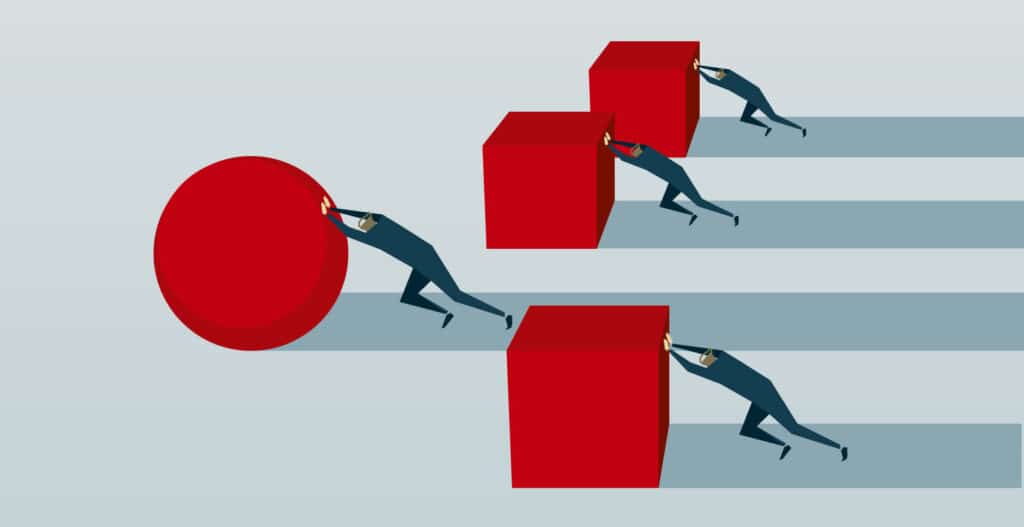I have written before about the fact that human beings are acutely sensitive to their surroundings, and adjust their behaviours according to even the most subtle of influences. This has profound implications for schools, and in one sense we can use this to our advantage – for example, talking about growth rather than static levels of attainment sends powerful signals – but it also brings certain dangers. Most important, in my view, is the danger that we begin to move from sending messages to influence good behaviour to setting up systems of rewards and punishments to coerce good behaviour. The former is fine; the latter is a disaster, and I want today to address two serious issues related to this central idea.
Students need to be guided into doing the right things, and it might seem that rewards and punishments are an effective way to push students in the right direction. After all, that’s how many jobs work; with bonuses and promotions at one end, and demotions and sackings at the other. This would be consistent with the behaviourist view of motivation, and can best be summarised as “do this and you’ll get that.” It’s a common-sense, and widely-held view.

The trouble is that this view of human motivation doesn’t stand up to critical enquiry – certainly in education, and as far as I can see, not elsewhere either. As I have written about previously, students are not machines whose levers we simply need to push and pull in the right combination to get the results we want. There’s a lot to say here, but the main thing is that ultimately, students need the freedom to make choices (relatively) freely or they are not really choices at all; and if they are not learning to make choices then we are not preparing students for an adult life which is full of choices. And while strict rewards and punishments can change behaviour in the short-term, in the long-term they undermine the values that promote the behaviours we seek to promote. That is, in the long-term, rewards and punishments don’t work even on their own terms; they are not effective in the long-term.
Secondly, we have to ask ourselves, even if they did work, what sort of school are we striving for? One where students simply respond, like donkeys, to the carrots and sticks that we dangle in front of their noses and strike their backsides with? A school where they did not strive to take initiative, to lobby for better systems, and push the boundaries? Probably not. We want a school where students learn to evaluate choices, and exercise their judgement.
I am not being naive here; I recognise that as a school we have systems, and we need to enforce rules. But we have Learning Principles; a Profile to aim for, and a Mission we can believe in – and these are to be treasured for their own sakes as intrinsically valuable; not valued simply because they are a means to a reward, or to avoid some punishment.
So here are two areas where our thinking is being tested; High School awards, and compulsory drug testing.
In terms of the drug testing, we have a College policy, which we are putting into practice here at East. Our context here is clear: taking illegal drugs is a very bad thing for students to be doing for a number of reasons. We want to encourage students to make the right choices, but clearly, we do not wish to become a police state. During the policy development the Dover student council asked for compulsory random drug testing, because such a policy gives students a credible reason to say ‘no’ when offered a choice. So when we implement the policy (as we will be doing shortly), it is not to catch and punish students; it is to support them in making the right choices (along with the rest of the support they get in the PSE programme). And if students have made a bad choice somewhere, our emphasis will be on counselling and support; that is, we will work with them to support some learning in this area. In my view there is a world of difference between this approach and a punitive one, even though the testing processes may look identical from the outside. Part of the challenge for us is to get this message across to students; by the time you read this, I will have talked to your children about it, and any support you can give would be most welcome.
High School awards are also a tricky area. Of course we want to celebrate excellence in our Learning Programme; and many schools do this by an honour roll, end of year awards, school colours or other such means. They offer the awards for sports, for maths, DT, service, and even for qualities such as ‘resilience.’ At first sight, this seems an excellent idea – they are a reward for the people who earn them, and set a level of aspiration for those who do not; that is, awards seem to send the right signals to students.
But there may be more to it than this. Firstly, some argue that awards do not work even on their own terms, and secondly, that even if they did work, they do not obviously align with the sort of school we aspire to be. This is because the messages we are sending are not, in fact, the ones we intend to send. Arguments and evidence for this position are easily found (a heartfelt plea can be found here) but I will summarise via observations from recent conversations with students.
In terms of celebrating excellence; here are comments from two very high achieving students who have been recognised for their excellence:
“I don’t think anything would be lost if we did not have awards. You don’t do it for the award. It’s nice, but you forget about it quickly.”“The trouble with colours is that people only did the service to get the colours; they didn’t really care about what they were doing and were only doing it for the colours.”
So some argue that awards either don’t encourage excellence at all, or if they do, they encourage excellence for the wrong reasons – which perhaps isn’t really excellence at all.
As for aspirations for those not receiving; another student pointed out that for every winner, there have to be many losers; that awards need to be scarce to be valuable. And in most cases, it’s either pretty clear from the outset that 95% of students aren’t even in the running (maths being the obvious example here) or else it’s so hard to judge who deserves an award (a service award? an award for being resilient?) that really, no-one knows who should get it anyway. In these cases, it is hard to see what value the rewards can have for the vast majority of students.
I write at length here as I know these are two important matters; and it’s interesting that they share certain points. The drug testing is based on a fixed policy, as you know; the awards issue is an ongoing matter of debate within the High School. I have argued for what is perhaps the less obvious side here, but there are other views. But the matter is not yet fixed, and we have not yet determined our stance here. If you have strong opinions, please do share your thoughts. We can discuss this and any other matters further.


